It Comes at Night: The Politics of a Contagion Narrative
From its opening scenes, the psychological thriller It Comes at Night (2017) invests deeply in the “contagion narrative.” The unseen entity that haunts this post-apocalyptic landscape, the flesh-eating disease, has infiltrated the intimate confines of home and hearth, which have been transformed into fortress and turret by the family that inhabits it. Writer and director Trey Edward Shults has put together a sparse family consisting of mother, father and teenage son, a stripped down main cast that delivers. They keep their home as their stronghold, protecting against what lies without and against the terror of the night. With great intensity, Shults builds the atmospheric space and dramatic tension so that the slightest action has a disturbing force, an unsettling impact. Zombies do not populate this contagion narrative; instead there is a bleak, direct and intimate portrayal of a family in the grip of an experience all too likely and all too close to the reality we the viewer inhabit. This psychological thriller hews close to reality, subtly advancing a possible scenario of viral outbreak and in so doing sets the stage for a chilling look at the more sinister aspects of social values, beliefs and reactions.
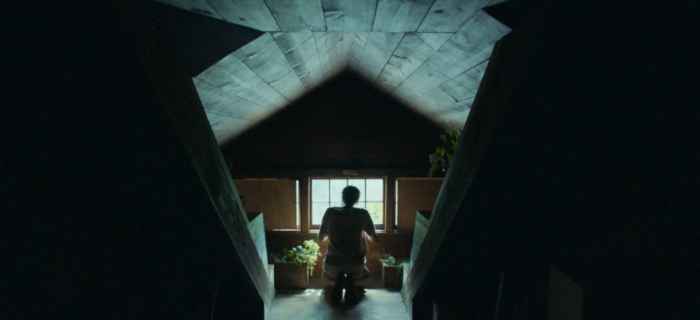
The home, heavily defended, paranoiacally watched, vigilantly asserted as safe-haven and justification for measures of extreme defense, becomes an over-determined stage-set for the narrative. And yet, the human psyche, the most porous surface of all cannot use its walls for protection—the psyche is vulnerable, susceptible and arguably the ultimate player in this hymn to paranoia in motion. Travis the teenage son is the main interlocutor between the viewer and the filmic space— it is his raw psychological profile that is advanced as the story moves along. Yet, within this profile is a story of power challenged and defended—the traumatic pressure of survival reveals the worst aspects of human nature, those of individualism, egotism, paranoia and aggression. With this in mind, I move to analyze the film for its dense network of socio-political metaphor. For the metaphor of contagion and the paranoiac protectionism that it invokes are stark symbolic forms. They have supreme significance in a contemporary socio-political landscape of border protection and right-wing counter-revolutions that give rise to an authoritarian ethos of hyper-conservativism.
In the opening scenes of It Comes at Night, the grandfather of the family is shown to be in an extreme state of collapse, and has grown into a grotesque horror from his infection. Uncanny forms of gas-mask wearing figures hover over the grandfather; these are the figures of the mother and father in full protective suits. Left with no other reasonable choice, the family must purge this contaminate from their strong-hold. In the euthanizing and burning of the grandfather’s body, an extreme moment of trauma is registered that haunts the narrative progression and foregrounds the ominous psychic atmosphere that pervades each scene. In the compulsive defense of their rigid structure and routine, the mother and father show the trembling marks of the trauma, desperately maintaining their sense of normalcy. The teenage son (Travis) in his vacancy, silence and child-like regression holds the trauma in him, a damned vision of the generation to come in this post-apocalyptic reality.
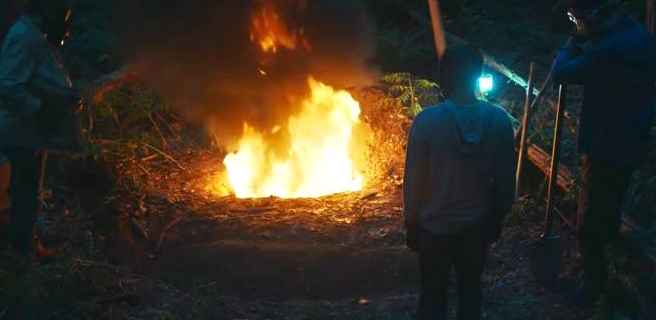
With the gunshot fired by the father, the camera pans to the teenage son and his mother who stand as witnesses to the execution. It is here, from the outset that the film begins its imaging of fear, isolation, psychosis and the extreme bouts of protectionism and defense they produce. A singular line issued by the father, Paul, sums up much of the overarching thematic of the writer/ director’s intent: “Do you know what people are capable of when they’re desperate?” This desperation in the face of crisis demands scrutiny, for the micro-politics of power emerge here where a state of emergency is used to facilitate the most egregious acts of violence and manipulation. Where reality becomes a struggle and life becomes a distortion of its previous state, some seek to use this distortion to their advantage, regressing to a state of Darwinian nature: survival of the fittest, or here survival of the cunning.
Family, as the first and primary political unit of the social order, serves as the sole foundation for loyalty and connection in this post-apocalyptic wilderness of the contagion. Coupled with the defense of property, the defense of family is sought with a paranoiac hyper-acuity and desperation: again, and again the line is issued that the characters of the primary family and the other family they will come to interact with are first and foremost in the service of preserving family and property. This primary unit of family and property issues forth as the cornerstone of an isolationist-hyper-conservatism and will suffice to justify the brutal ends to which the father (Paul) and mother (Sarah) go to perpetuate and preserve it. Writing for The New York Times, film critic A.O. Scott, discusses both It Comes at Night and the director’s previous film Krisha, arguing that “Both films are about the impulse to preserve a sense of normalcy in difficult circumstances, and both reveal the cruelty behind that impulse.”
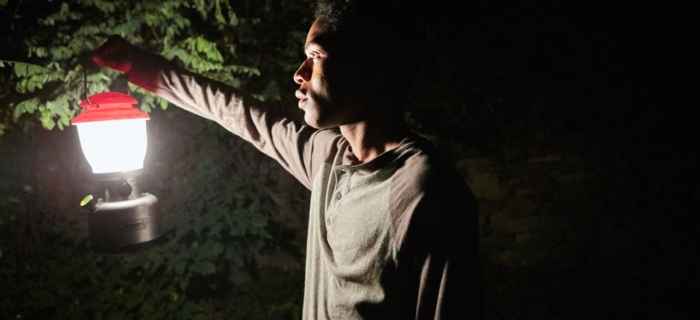
Added to the primary unit of the protection of family and property is the lynch-pin of an isolationist conservativism and its ideology of control: the totalizing threat of an unseen agent of contamination, the threat from without that poisons body and mind indiscriminately. Contagion stands as a threat simultaneously from without and within, a threat empty of logic and of source, only full of symptom. Thus, with this phantom threat, an all-consuming one of torturous death, the external world and all those whom inhabit it become suspect and Other.
When a man arrives trying to force his way into the house, he is seized by the father for questioning and perhaps execution. In an attempt at his defense the man tries to explain himself, citing that the house looked abandoned in its shuddered and boarded state. What follows is a pre-emptive strike taken by the father that perfectly aligns and resonates with symbolic force the stark political metaphor that the film projects. The young man is strapped to a tree and essentially subjected to military style torture tactics: hooded and left out in the elements, deprived of food and water, left to break under the extremes of exposure. In this way, he is questioned by the father, and desperately surrenders his story again reiterating the line of the conservative ethos: protection and preservation of family.
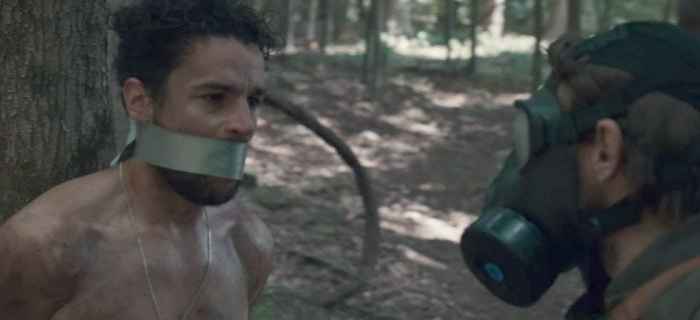
Defense of property and family, reverence for family as the primary and singular unit of certitude and fidelity, economic rationing of goods and the ethos of a furtive industriousness—these elements of a conservative world-view are thrown into a monstrous light of compulsion, they are excessively maintained. “Paul and Sarah are not only struggling to save their family but also to hold onto a civilization—a sense of order, of dignity, of stability—that is in the midst of collapsing. If, that is, it ever really existed in the first place,” states A.O. Scott of The New York Times. Certainly, it is the pressure of this collapsing and the fanatical maintenance of this perceived order, real or otherwise that pervades the characters.
When another small family, that of the young man subjected to the father’s torture tactics, is wearily taken in by the primary family, it is with cold calculating rationality and self-interest—they have food and animals to share in exchange for water. Taken into the family’s stronghold, relief is initially registered by all: the two families find themselves sharing much needed company, momentarily breaking the mind-numbing isolation of the wilderness. However, things quickly deteriorate as creeping paranoia and distrust seep back in and a series of events including the disappearance of the family dog into the dark, thickness of the wooded fringe unnerve all in the house. When the young man attempts to speak to the father about other collectives or communities of the uninfected, the father balks at the idea of leaving his controlled isolation to go in search of or join any collective.
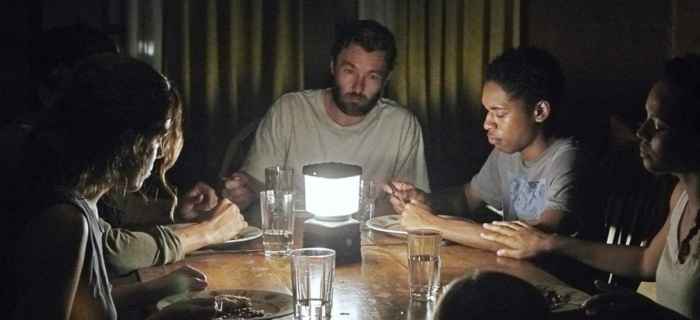
Throughout this narrative action, the main through-line of the plot is redoubled by the uncanny thrust of the teenage son’s dream-world. A surreal dreamscape of the house, yard and darkly looming woods that create the protective fringe around it, creates a dark parallel reality to the waking world of the same. These dreams provide at first a crystallized omen of the slip into paranoiac free-fall, the hysterical defense and accusation to come later in the film. Each devastating event has its reciprocal register in the psychic discontent of this dream realm: when the grandfather passes it is with grotesque distortion that he reappears in all the vile corruption of infected death. Developing ever further, these horrors are what really comes at night, the inescapable hostility of a psyche warped by trauma and fear.
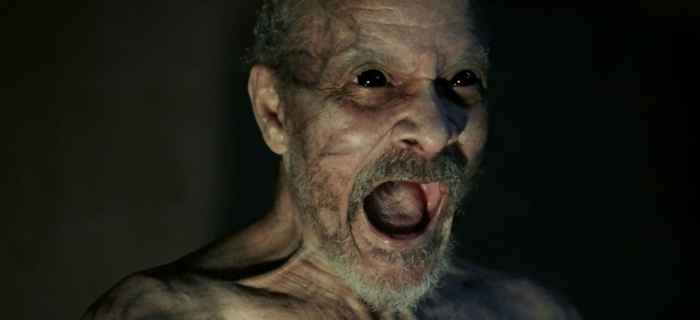
In one particularly startling scene, the existential dread of contagion sweeps in to haunt the very psycho-sexual terrain of the teenage son’s lustful fantasy. After a mid-night encounter with the mother of the secondary family—neither can sleep and commiserate over this sharing an intimate moment—he slips into a feverish fantasy where he vents his repressed teenage sexuality. Young and beautiful, the woman’s proximity in age and tender gaze makes her an irresistible target for infatuation.
Surrendering to the dream, the son watches in a stunned state as the young woman creeps into his room straddling him in his bed, making sensual advances and leaning in close to his face. Locking her lips to his, she releases and parts remaining fixed over him, a thick concentration of viscous red ooze pours from her open-mouth directly into his own as he lies pinned beneath her. A shocking scene that at once displays the utter extremity to which the ultimate threat of contagion has infected the mind of the youth, seeping into the last reserve of his fantasy.
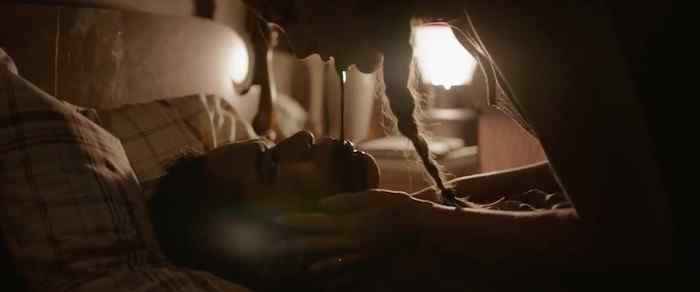
Ultimately, things fall miserably apart, the carefully preserved security of the family is broken. Infection enters the household once again, bringing about the base de-evolution of the two families into two warring factions. The primary family unit revealed for what they always were, a brutal regime of radical self-interest, seizes on the moment using the weapons at their disposal: terror and dread. Infection enters in a series of terrifying moments that are clouded and obscured by the collapsing of the teenage son’s dream-world into the night of reality. Intentionally ambiguous, the viewer is left to wonder over several key details—the sleep walking child could’ve opened the front door and allowed the infected dog access to the house, but he would have to access the lock, and then there is the teenage son who was wondering the house and could have done it in his own fever-dream state. Regardless, the film concludes with a rapid succession of movements through the halls of the stronghold and out into the yard and surrounding woods. These movements are sparked by fear, hysterical reaction and a sinister calculating rationalism.
Quarantined in their room the second family moves to escape; they simply want to leave with a fair ration of what they came with, to survive in the wilderness of the contagion. Thus, the two powers vie for power and occupation of the stronghold. In a scene on the stairs the second family is held at gunpoint by the primary family but in a swift turnover the gun is seized throwing power back and forth. Paul wants to seize the second family’s resources and questions whether they should even be set free. Before there is time for further thought, the second family bursts from the house with the armed mother and father following behind. Not content to leave them running into the wilderness by gunpoint, ousting them with no food and water, the father makes the ultimate pre-emptive strike executing the young father, mother and child as they attempt their escape.
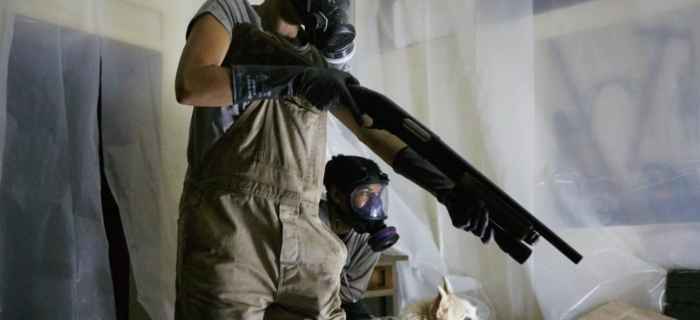
An absolute microcosm of politico-economic struggle is brought forth in these last explosive scenes. The viewer must wonder if this was the plan all along, to prey upon this young family in order to take valuable resources and even labor power, leaving them for dead or ejecting them from the house-cum-stronghold. Power is brutally seized and contested here, a struggle for resources, entitlements and survival are compounded by fear, suspicion and paranoia—all ending in bloody massacre and a primitive accumulation of resources.
In many ways the film performs the part of a larger allegory regarding the deeply individualistic and atomized nature of contemporary American society. Making us question the extent to which a family and its property can be maintained even under desperate conditions—the ethical line seems to vanish even as it is drawn. And what of the pre-emptive strikes that are taken on by the primary family? Over and over the means and ends must be questioned, for one can simply lose all humanity in the desperation of survival. After all, when humanity is lost and there is so much blood on your hands, do the petty items you hold really keep the value of all that they cost?
What do you think? Leave a comment.











I like a well executed horror film. I’m willing to check it out.
I was really enjoying the film when I was watching…..It had a great tension to it and the way that you were never quite sure what was happening and whether everyone was who they said they were drew you in……..then the film ended……just like that.
This isn’t a film with a clever ending or one where it is left up to the audience to decide exactly what story the director wanted to tell. It basically wasn’t even an ending – the movie just stopped. Everyone in the cinema had the same confused face of “….what the hell just happened”. Was honestly a real shame because, as said above, the rest of the film was really good but it honestly not worth watching. Reminded me of the first bit of lost – let’s introduce all these different things (scary monster, people already on the island, a bunker you can’t get in, some kind of numbers etc.) and then just went “The End” without ever explaining any of them.
Excellent, finally something worth watching. I’m still waiting for a worthy successor to ’28 Days Later’ and the first ‘Alien’. Aliens, crazies, monsters and mayhem, bring it on!
What? Did we watch the same movie? The father didn’t kill all 3 of the other family, the mother killed the young-father after he nearly killed the father with punches to the head as he said “Fuck you”. And you didn’t mention that whether they brought the disease in or not, the second family was sick.
I was really disappointed when I saw this.
Felt the sound and cinematography were great, but the film was messy and lacking focus.
I think it was close to being great, but missed.
This is the film equivalent of Coldplay lyrics: words that fit somehow together and kind of sound nice, until you actually realise it’s a bunch of non-sequitur clichés mashed randomly together with as much depth as a gooey sixth former’s first and last love poem.
The fact the film’s title literally has nothing to do with the story itself is a perfect example: “It comes at night”.
Movie producer: “Yeah that sounds scary. Night is scary and stuff. Boom. Sell it”.
It was excellent if downbeat.
A downbeat cousin of The Road!
One thing – and it never gets addressed in post-apocalypse drama – how do they always seem to have a ready supply of petrol or diesel for their vehicles?
I always assumed that a suddenly-dead civilisation would mean lots of abandoned petrol stations to use (and abandoned cars to siphon), i.e. enough to keep driving for however long you want (or have got left, depending on plot).
you need a lot fuel every day to keep millions on the road – so with so many millions gone the few will have plenty. The US uses 400 million gallons a day – so with a sudden wipe out 100 million gallons will last ages.
28 Days Later addressed this brilliantly which is why it is the consummate post-apocalyptic film. Masterpiece.
Sounds quite similar to Carriers only in a house instead of on the road. I do like a good epidemic in a film.
An epidemic movie cannot be whacked. There should be festivals dedicated to them.
I love a bit of post-apocalyptic action.
Me too, it provides an excellent platform for drama and action!
There’s a lot of similarities between this and Krisha, although Schultz’s first film is the better of the two. Still a taut and intense experience. Just don’t go in expecting a horror.
Joel Edgerton is one hell of an actor/writer,thought The Gift was a darkly delicious piece of work, and this latest has got me buzzing also.
The Gift was excellent!
Totally agree with you,saw it at the cinema when it came out,one dark delight,funnily enough picked it up in a charity shop the other day for £1.99p..outrageous.
He plays such an interesting and complex role in this film, real superior talent.
It’s good to see this article go live. A well written piece of work and a good read.
thank you, it was definitely an experiment in creative interpretation as well as a bit of cultural analysis. I really wanted to treat the film as a complex political allegory, but I’m glad overall that it was a good read.
A fascinating read. I was especially interested in your discussion of the portrayal and subversion of the family. Great work.
It seems like in dystopian stories, once the premise is set up it demands ever more questions and clumsy exposition. E.g. ‘how are they cooking their food?’ or ‘where did they get from?’ Must be tricky for the writers to know how far to go to explain the most nagging issues. There’s ONE little bit in this film where they say ‘we use the solar power to charge the batteries’. But it’s used as nice way to show their teamwork and co-op spirit.
Sounds rather like a good episode of the Walking Dead, if in earlier better-written days remembering season 2.
Yeah, I think there is a connection here and the writer/director was capitalizing on the current interest in post-apocalyptic type narratives. But I think the film goes beyond the Walking Dead through its intense psychological realism.
Timely and relevant!
This was already done very well in Chris Pine’s ‘Carriers’.
Monumentally disappointing to be honest. Just quite dull. Felt like watching a superior episode of The Walking Dead in terms of post-apocalyptic angst. Performances were all perfectly decent, but nowhere near as taut, claustrophobic or atmospheric as people would have you think. And the way the whole thing plays out is just massively predictable.
Shame.
Humans are such complicated things. It’s truly interesting watching the struggle of characters dance between civility and their primitive nature. I’m excited to watch this movie now.
This film left me speechless, and so did your analysis of it. Beautifully written and spot-on. To anyone who hasn’t seen this movie yet, I highly recommend it.
An interesting discussion on a movie I saw and didn’t enjoy. I think this essay is better than the movie.